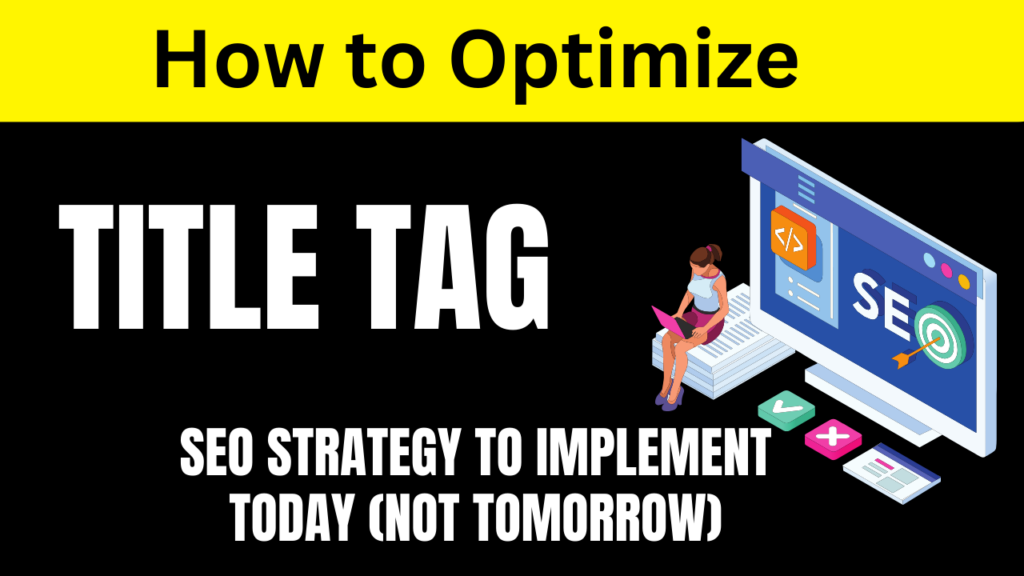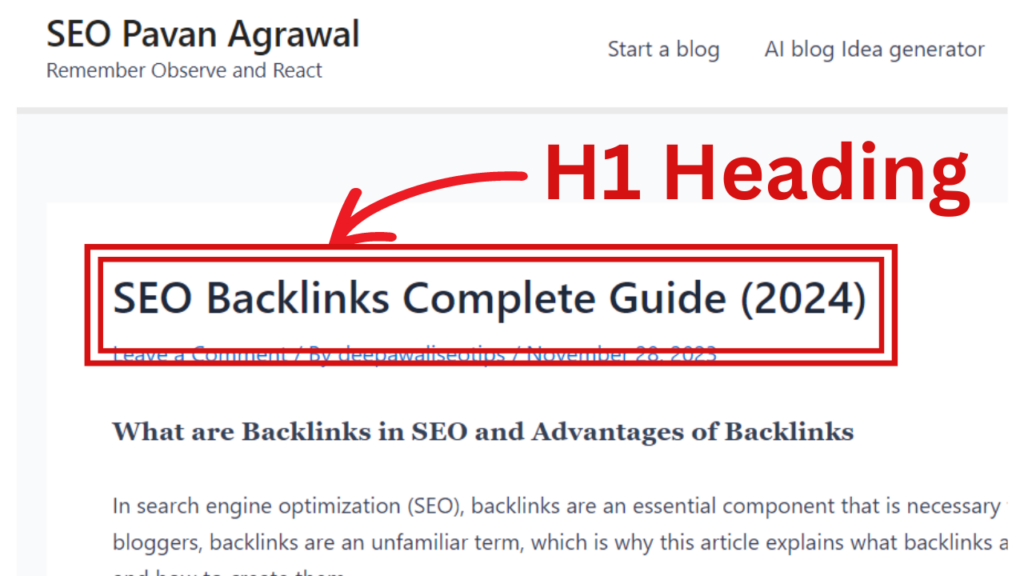Have you ever done keyword research? Do you know what Keyword Research is and how to do it? For that, you first need to understand what Keyword Research is. While writing content, many bloggers add some keywords that have very low search volume, due to which they don’t get traffic. Especially, I have seen that beginner bloggers make this mistake quite often.

Do you also add keywords to your blog post without doing proper keyword research? If you find keywords in this manner, then don’t do it; it will not benefit you.
Proper keyword research is an art that must be learned so that a website can grow as quickly as possible. Do you also want to start your own website or have you already started one? Are you getting good traffic on that website? If not, then this is a big mistake on your part.
Did you know that within about 3 months of starting, 95% of new bloggers shut down their websites because they do not get traffic? Don’t you think that the lack of traffic is due to not being able to do proper keyword research?
Are you also going to shut down your website because you are not getting traffic? If yes, then you should read this article because in it, I have explained how to do proper keyword research, most of which are free and some are paid methods. If you are a beginner blogger and do not have an investment, then I would recommend that you do keyword research using free methods.
Don’t worry, I also use free methods for my website Deepawali.co.in.
So, are you ready to make your website successful? If yes, then let’s first understand what a Keyword is and how to use it.
What is Keyword?
In the SEO field, the words and topics that users search for are called keywords. Because of this, Google is able to understand the intent of the content and rank it accordingly.
As small as the word ‘keyword’ may seem when you read it, its meaning is significantly larger. Conducting keyword research is not difficult, you just need to know how to do it.
Keywords are those words or phrases that are typed into Google’s search engine and searched for by users. Without keywords, you or anyone else simply cannot write any article or content.
Keywords indicate what you have written on your webpage. How quickly your article will rank depends on the keywords you have written. If your article contains keywords that match those searched by users, the chances of your article ranking increase.
For example, if you search on Google ‘What is Digital Marketing?’ these words are called keywords, and searching for such keywords is what comes under keyword research. So, let’s understand what keyword research is?
What Is Keyword Research
Keyword Research is an important part of SEO. It refers to the research you conduct to select the right keywords with the intention of ranking your content in a search engine.
It involves understanding which types of keywords users are searching for the most on search engines and what the related keywords are. This process is known as “Keyword Research.”
Before conducting keyword research, you should write content based on the traffic coming to that keyword and its competition so that your content can rank in search engines.
There are many tools available on the internet that can help you easily conduct keyword research.
If you do not use the right keywords in your content, Google’s bots will not show your content in search results because content ranks on Google due to keywords.
Types of Keywords
Keywords are primarily of two types.
- Short Tail Keywords
- Long Tail Keywords
Let me explain these to you in detail.
- Short Tail Keywords
Short-tail keywords, also known as “head terms,” are search phrases that are typically one to three words in length. They are broad, general, and tend to have a very high search volume, which also means they usually have high competition. Because of their broad nature, short-tail keywords often don’t convert as well as long-tail keywords, since they’re not as specific to the searcher’s intent.
Examples of Short-Tail Keywords:
- “Laptops”
- “SEO”
- “Coffee shop”
- “Books”
- “Yoga”
Each of these examples is very general and would attract a vast, diverse audience. The intent of the searcher can vary widely, making it more challenging to tailor content to meet their needs.
Short Tail Keywords are the most commonly searched by users, which is why they are also referred to as high-ranking keywords. However, if your website’s domain score is less than 60, targeting these keywords is unwise because the competition for these keywords is usually very high.
- Long Tail Keywords
Long-tail keywords are phrases that are more specific and usually longer than more commonly used keywords. They are often three or more words in length. Long-tail keywords are targeted and less competitive than shorter keyword phrases, which are often referred to as “head terms” or “short-tail keywords.” Because they are more specific, they typically have a lower search volume, but they also usually have a higher conversion value as they are more specific to user intent.
Here are some examples of long-tail keywords:
- “best organic dog food for sensitive stomachs”
- “affordable bed and breakfast in Savannah, Georgia”
- “how to start a vegetable garden in New England”
- “women’s waterproof hiking boots reviews”
- “tips for learning German as a second language”
Each of these examples is specific and would likely attract a very targeted audience that is further along in the buying cycle or information gathering process, compared to head terms like “dog food,” “bed and breakfast,” “garden tips,” “hiking boots,” or “learn German.”
Even though a long-tail keyword may have fewer searches, it is easier to rank for compared to a short-tail keyword because there is less competition. Google also recommends focusing more on long-tail keywords rather than short-tail keywords.
If you are a beginner blogger, you should not attempt to add short-tail keywords to your content because it will not be beneficial, and your efforts could be wasted.
How to do Keyword research
Now you have learned what keyword research is and why it is important. The question then arises, how do you conduct keyword research for SEO (Search Engine Optimization)? Let me tell you how you can do keyword research.
If you want your content to rank in search engines, you should definitely conduct keyword research.
You can do keyword research in two ways: free and paid. Let’s understand both of these one by one.
- How to do Free keyword research
Do you want to conduct keyword research for free? Then you are in the right place. Let me explain to you how to do keyword research for free.
If you are new to the world of blogging and want to do keyword research for your content but can’t invest in paid keyword research tools, then this article will be very helpful for you.
This process is a bit lengthy, but it will provide you with the best keywords. Let’s go through the whole process point by point.
First, you need to select a keyword. For example, let’s say my focus keyword is “what is keyword research”. After this, you have to type that keyword into Google Search. After doing so, Google will show you some suggestions. Those suggestions will be related keywords that you need to add to your blog.
I think you might only know this method, which can be called basic keyword research, because with this you can’t find many keywords.
So, what should I do then?
There is another method for keyword research, a bit different, which is called advanced keyword research. There are many ways to do advanced keyword research that professional bloggers use, but I believe that all bloggers should use this to increase the traffic to their website.
Do you want to learn that?
Yes, then let’s get started
11 best free keyword research tools
- Google Autocomplete:
- Simply start typing a keyword into the Google search bar and observe the autocomplete suggestions. These are commonly searched terms related to your initial keyword.
- Google Related Searches:
- After performing a search on Google, scroll to the bottom of the search results page to find related searches. These can give you ideas for long-tail keywords and variations to consider.
- Google Trends:
- Use Google Trends to determine the popularity of certain keywords over time, which can help you choose keywords that are trending upwards.
- Google Keyword Planner:
- Although it’s part of Google Ads, you can use the Google Keyword Planner for free to discover new keywords and see search volume and forecasts for your keywords.
- Competitor Analysis:
- Look at what keywords your competitors are ranking for. Tools like Moz’s Free Domain SEO Analysis Tool can help with this.
- Keyword Surfer:
- A free Chrome extension that shows estimated global and monthly search volumes for any query typed into Google.
- Keyworddit:
- This is a unique tool that extracts keywords from Reddit. It gives you an idea of the topics that interest your audience.
- Google Search Console:
- This isn’t a keyword research tool in the traditional sense, but you can use it to see which keywords bring users to your existing pages.
- Content Gap Analysis:
- By manually checking what content is out there and what gaps exist, you can identify keyword opportunities that others have missed.
- SEOquake:
- A free plugin that provides key SEO metrics, along with other useful tools such as SEO Audit and many others.
- YouTube Autocomplete and Related Searches:
- If you’re looking for video content keywords, the autocomplete feature on YouTube is a great way to see what people are searching for.
Paid Keyword research
If you’re a mediocre blogger and have launched a website that has started earning, it’s beneficial for you to invest in a paid keyword research tool to grow your website.
If you’re considering using a paid keyword research tool, I would recommend Ahrefs and SEMrush. These tools are renowned for their comprehensive data and features that can significantly aid in enhancing your SEO efforts.
Besides these, there are numerous other paid tools available on the internet which I will list below. With the help of these tools, you can easily select the best keywords for your content based on search volume and keyword ranking, and you can rank your content on Google more effectively.
Additional Details for Paid Keyword Research Tools:
- Ahrefs: Ahrefs is not just a keyword research tool; it’s a complete SEO platform that allows you to do competitor analysis, backlink research, content research, and track your rankings. Its keyword explorer gives you detailed information on keyword difficulty, search volume, click data, and a comprehensive keyword list based on the term you enter.
- SEMrush: SEMrush offers a suite of tools including keyword research, site audit, SEO content template, and more. It’s especially powerful for competitive analysis, allowing you to see which keywords your competitors are ranking for and how you might be able to outrank them.
- Moz Pro: Moz’s suite of tools includes Keyword Explorer, Link Explorer, and their proprietary Page Authority and Domain Authority metrics. It’s known for its user-friendly interface and the quality of its data.
- Majestic: Majestic provides a wealth of data primarily focused on backlinks, but it’s also useful for finding keywords that websites are targeting, giving you insights into your competitors’ strategies.
- SpyFu: This is an excellent tool for understanding your competitors’ keyword strategies, seeing how often certain keywords are searched, and how those searches have changed over time.
- KWFinder: KWFinder by Mangools is great for finding long-tail keywords with low SEO difficulty. It’s very user-friendly and a good starting point for bloggers looking to delve into paid tools.
- Long Tail Pro: As the name suggests, this tool specializes in finding long-tail keywords which are less competitive and more targeted, making it easier to rank for them.
- SERPstat: This is a growth hacking tool that is great for SEO, PPC, and content marketing. It provides a detailed keyword research feature along with website analysis.
When choosing a paid keyword research tool, it’s important to consider your specific needs, budget, and the complexity of your SEO strategy. Most of these tools offer a trial period or a limited free version, so it’s a good idea to test them out before committing to a subscription.
Benefits of Keyword Research
Keyword research is a fundamental practice in search engine optimization (SEO) and has several benefits that can help improve the visibility and success of a website. Here are some of the key benefits of conducting thorough keyword research:
- Improved Rankings: By understanding the most searched keywords related to your topic, you can optimize your content to rank higher in search engine results pages (SERPs), which can lead to more organic traffic.
- Understanding Your Audience: Keyword research helps you understand the language your target audience uses to search for information. This allows you to tailor your content to match their needs and queries.
- Increased Traffic: Targeting the right keywords can draw more visitors to your site. By focusing on keywords that have a good balance of high search volume and manageable competition, you can attract more qualified traffic.
- Better Content Strategy: Knowing which keywords are popular can guide your content strategy, helping you to create articles, videos, and other content that meets the demands of your audience.
- Competitive Analysis: Keyword research gives you insight into what your competitors are targeting. You can use this information to create a strategy to compete for the same keywords or to target gaps they may be missing.
- Higher Conversion Rates: By targeting keywords that are more specific and often closer to the point of purchase, known as long-tail keywords, you can attract visitors who are more likely to convert into customers or leads.
- Market Trends Awareness: Keyword trends can provide you with insights into market behaviors and shifts in consumer interests, allowing you to adapt your offerings and content to current demands.
- Cost Efficiency: For those using pay-per-click (PPC) advertising, keyword research can help in finding cost-effective keywords that can reduce the average cost per click while still driving quality traffic.
- Search Intent Understanding: Not all keywords are created equal. Some search terms may have a higher intent to purchase, while others are informational. Keyword research helps in distinguishing these intents, so you can create content that directly addresses the users’ needs.
- SEO ROI: By targeting the right keywords, you can optimize your SEO efforts for better return on investment. Effective keyword research ensures that you are not wasting time and resources on keywords that won’t bring valuable traffic.
- Localized Strategy: For local businesses, keyword research can help identify geo-specific keywords that draw in a local audience, which is crucial for brick-and-mortar businesses and service providers.
- Content Relevance: By aligning your content with the right keywords, you ensure that your website remains relevant and useful to users, which can improve engagement and the likelihood of return visits.
Overall, keyword research is about understanding the market demand for certain terms, the competition you’re up against, and the content you need to create to align with both. It’s a strategic tool that can significantly influence the direction and effectiveness of your online marketing efforts.
Difference between Quality Of Keyword and Quantity Of Keyword
Quality of Keyword:
- Relevance: High-quality keywords are highly relevant to the content on the page and to what the users are searching for. They match the user’s search intent, whether it’s informational, navigational, transactional, or commercial.
- Conversion Potential: Quality keywords are often those that have a higher likelihood of leading to a conversion, such as a sale, sign-up, or another desired action.
- Competitiveness: A quality keyword is one that strikes a balance between high search volume and a level of competition that is surmountable for your website.
- Specificity: High-quality keywords often include long-tail keywords, which are more specific and targeted than generic, short-tail keywords.
- Search Volume: While not the only indicator, a good quality keyword will usually have a sufficient search volume indicating that people are actively looking for that topic or item.
Quantity of Keywords:
- Volume: This refers to the number of keywords that a piece of content or a website is targeting. Having a larger quantity of keywords can increase the chances of ranking for various searches.
- Keyword Variations: Including a variety of keywords can help capture a wider audience due to the different ways people may phrase their searches.
- Long-Tail Expansion: A strategy focused on quantity will include many long-tail keyword variations, which can capture highly specific search traffic.
- Keyword Stuffing Risks: Focusing too much on quantity without regard to quality and relevance can lead to keyword stuffing, which can negatively impact SEO as it creates a poor user experience and can be penalized by search engines.
In summary, the quality of a keyword is about how well it can potentially perform in bringing relevant traffic that is likely to convert. The quantity of keywords is about the breadth of visibility across different searches. An effective keyword strategy should balance both aspects, targeting high-quality keywords while also incorporating a sufficient quantity of relevant variations to cover a wider array of search queries.
Conclusion
“Friends, as you have learned in this article, what is Keyword Research? (What is Keyword research in Hindi) Through Keyword Research, you can make your Article meaningful and impeccable.
Do you know that many users on Google search by jumbling words, like let me tell you ‘keyword research in seo in Hindi’. Did you notice anything in this sentence? If you didn’t understand, let me tell you that the words are written in a jumbled order, yet Google still shows results to users and also suggests ideas. This shows that whatever you type on Google, in any way, Google will definitely show you results and also suggest related keywords.
Both Short Tail Keywords and Long Tail Keywords types are available for free from Google’s search engine for your webpage. Alongside this, you have learned how to do Keyword Research? (How to do keyword research in Hindi) There are many tools available for free Keyword research, but Google’s own Search Engine is the best keyword research tool in Hindi. There are some paid Keyword Research Tools available, with the help of which you can find out the volume of any specific keyword, how much % it is being searched, and how much competition there is for that keyword.
- The distinction between short-tail and long-tail keywords is crucial. Short-tail keywords are typically one to two words long and have a higher search volume, which also means they’re highly competitive. On the other hand, long-tail keywords are longer phrases that are more specific and often less competitive, making them more targeted and potentially more valuable for driving relevant traffic.
- Google’s own search engine can be a powerful tool for conducting keyword research. By analyzing the search suggestions and auto-completions, as well as “People also ask” sections and related searches, you can gather insights into what users are searching for.
- Paid keyword research tools can provide in-depth analytics, like keyword difficulty, search volume, and competition levels, which are essential for a strategic approach to SEO and can be worth the investment for serious SEO practitioners and businesses.
FAQ
Q: What is Keyword Density?
A: In simple terms, keyword density is a measure. It allows you to determine the total number of words in your article and how many times the main keyword has been used. For on-page SEO, keyword research is very crucial as it helps you rank your article. In keyword density, you have to use the main keyword more frequently and also use related keywords.
Q: What are Brand Keywords?
A: Branded keywords are those that include the name of a company or website brand or a variation of it. For example, in semrush.com, SEMrush is a branded keyword. You cannot use these branded keywords in your domain name, and if you do, you may have to pay a fine. It is wise to read the terms and conditions before adding branded keywords to your content; without permission, branded keywords cannot be used on any online platform.
Q: What are Generic Keywords?
A: Generic keywords can also be referred to as broad keywords which use a short-tail keyword with a very wide reach. Ranking on Google for any generic keyword is quite difficult because the competition is very high. If you are a new blogger, do not use these types of keywords at all. Instead, you can easily rank your website by using long-tail keywords. Google also recommends that until your website’s authority is over 60, targeting any generic keyword is futile.”



